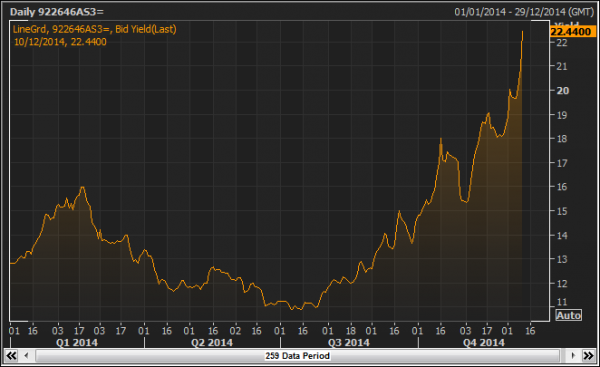Venezuela’s coming nightmare debt holdout saga?
 Last week, Cleary Gottlieb – the US law firm representing Argentina in its debt negotiations – held a packed closed-door session on Venezuela. The question of the day was: what if Venezuela defaults? This week, the US Senate passed a bill that seeks to sanction Venezuelan officials for alleged human rights violations. Although these two events are not obviously related — and the sanctions bill still has to be approved by Congress, and signed into law by Barack Obama — they could become so. They both also illuminate the horrible mess that Venezuela could be heading into.
Last week, Cleary Gottlieb – the US law firm representing Argentina in its debt negotiations – held a packed closed-door session on Venezuela. The question of the day was: what if Venezuela defaults? This week, the US Senate passed a bill that seeks to sanction Venezuelan officials for alleged human rights violations. Although these two events are not obviously related — and the sanctions bill still has to be approved by Congress, and signed into law by Barack Obama — they could become so. They both also illuminate the horrible mess that Venezuela could be heading into.
Let’s start with Cleary Gottleib. The reason for investor interest in its seminar is patently clear. In fact, it screams from every Bloomberg or Reuters terminal. Despite continuous reassurances from Caracas that it wants to service its bonds, and despite sitting on the world’s largest energy reserves, the country’s benchmark 2027 dollar bond is yielding over 22 per cent – far higher even than Ukrainian bonds (see below). Credit default swaps meanwhile suggest that the likelihood of a Venezuelan default within the next two years is 73 per cent. As for debt sustainability exercises, Credit Suisse reckons the country needs Brent oil prices to be in the $94 to $107 range to balance its books (versus $64 a barrel today).
The question therefore becomes: on which bonds might Venezuela be more likely to default — its sovereign debt, or paper issued by PdVSA, the national oil company?
The consensus, should a default happen, seems to be sovereign paper — and for two reasons. First, according to IFR, Venezuelan sovereign debt contains collective action clauses. These mean a 75 per cent majority of investors can agree to a binding debt restructuring. That in turn means that any default would likely avoid the mess that Argentina has got into with holdout creditors who have sued for full repayment on its bonds, which did not have collective action clauses.
And, second, a default on sovereign paper need not necessarily mean it would be possible for investors to seize PdVSA’s assets in the US, such as the Citgo refineries, because doing so would require proof that they are an alter ego for the Venezuelan state. Assets for Argentine oil company YPF, for example, have not been attached in the dispute over Argentine sovereign debt in New York courts.
None of this is to say a Venezuelan debt restructuring would be easy or simple – that would be oxymoronic. But it could be easier or harder, depending on how the default happens. And this is where the Senate bill might come in.
Earlier this year, the White House was opposed to placing additional sanctions on Venezuelan officials on the basis that it could sabotage efforts by some Latin American countries to mediate between the government and the opposition. Additional sanctions could also prove counterproductive by providing a nationalist rallying point for Nicolás Maduro, the president (pictured above at a rally this year).
But since then, the mediation talks have failed “miserably, without even a whimper,” as Chris Sabatini, senior policy director at the Americas Society and Council of the Americas, puts it. Furthermore, Latin American states have subsequently done nothing that might prompt investigation of Venezuelan human rights abuses, even as Caracas has ramped up persecution of opposition leaders while also ignoring calls from the United Nations Special Rapporteur on Human Rights.
Whether the US bill, if it passes into law, would do anything to improve the state of affairs in Venezuela is debatable. Certainly, it might shine a light on Venezuelan abuses and provide moral succor to its proponents. Certainly, though, it would also give Maduro a nationalist rallying point. On Tuesday, he lashed out at the bill on national television.
Maduro’s “outrage and condemnation” of “insolent, imperialist sanctions” may or may not continue to carry much weight with the Venezuelan public. But if Venezuela also defaulted, and then got caught up in a litigious debt restructuring with holdout hedge funds in New York courts, it is not hard to imagine some awfully messy scenarios. The combination of ramped-up nationalist sentiment and aggressive lawyers’ language could make even the acrimonious and drawn-out Argentine holdout saga look like a walk in the park.

Keine Kommentare:
Kommentar veröffentlichen